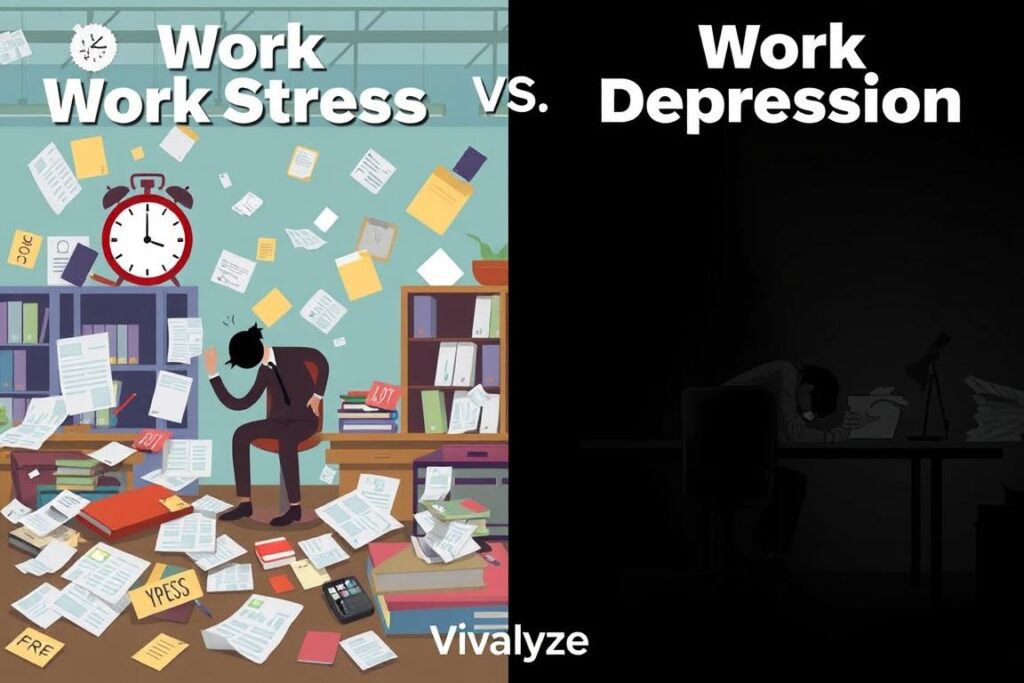Table of Contents
As you sit at your desk, the weight of your workload feels like a heavy burden. The constant demands, endless meetings, and never-ending deadlines leave you feeling drained. You’re no stranger to the challenges of navigating the modern workplace, but lately, you’ve been struggling with something more.
You’ve been feeling a persistent sense of sadness, anxiety, and lack of motivation. This feeling just won’t go away. Welcome to the world of work depression, a silent epidemic affecting millions of Americans like yourself each year.
Based on the National Institute of Mental Health, . The State of Mental Health in America 2021 survey reported a. As full-time employees, , leaving little room for rest and self-care. It’s no wonder that work depression has become a growing concern, with depression ranking .

What is Work Depression?
Work depression, also known as occupational stress or workplace depression, is a form of depression linked to work. It doesn’t directly cause depression, but the work environment can greatly affect mental health. This can lead to physical and emotional symptoms.
Impact of Work Depression on Employees
Work depression can have serious effects on employees. It can cause them to miss work, lose productivity, and increase healthcare costs. Mental health issues are the third most common reason for missing work. Work depression costs $1 billion each year in lost productivity.
Risk Factors for Work Depression
Some workplace factors can raise the risk of work depression. These include dismissive managers, workplace politics, bullying, high job demands, and limited social support. Personal traits and past work experiences also play a role in burnout, which is linked to depression.
It’s important to spot work depression early to prevent worse outcomes for employees. Employers and employees must focus on creating a supportive work environment. This can help reduce the risk of work depression.
“Almost 15% of those suffering from severe depression die by suicide.”
The seriousness of work depression highlights its need for recognition and action. By understanding the risks and taking steps, employers and employees can improve the work culture. This makes the workplace more positive and supportive.
Signs and Symptoms of Work Depression
It’s important to know the signs of work depression to get help. Symptoms of depression can last for weeks or months. They can really affect a person’s job, friends, and family.
Physical Signs of Work Depression
Work depression can show in physical ways. This includes changes in appetite or weight, feeling very tired, and trouble sleeping. People might also feel more anxious, tired, and have headaches or stomach problems.
Emotional and Behavioral Signs
Work depression can show in how someone feels and acts. They might feel bored, unmotivated, sad, and irritable. They could also cry a lot and pull away from friends.
It’s important to know that grief and depression are different. Grief is a normal reaction to loss, but depression is an illness. There are different kinds of depression, like postpartum depression and bipolar disorder, each with its own signs.
If someone feels depressed most of the day, every day, for over 2 weeks, they should get help. Getting help early can really help manage work depression and improve their life.

Causes of Work Depression
Work can be tough, and sometimes it makes us feel sad. Research shows that work depression can come from a toxic work environment, workplace stress, and feeling unhappy with our jobs.
A toxic work environment is a big problem. It includes mean managers, office politics, and bullying. Feeling ignored, powerless, or disconnected can make us sad, anxious, and burnt out.
Workplace stress is another big issue. People work long hours, often without a good balance between work and life. This stress can make us feel overwhelmed and doubt our skills.
Feeling unhappy with our jobs is also a big cause of depression. When our work doesn’t match our values or goals, we feel disconnected and depressed. Many people feel unengaged or dread going to work, showing how common this problem is.
It’s important to tackle the root causes of work depression. By understanding the effects of a bad work environment, too much work, and not matching personal and job goals, we can improve work places. This way, we can make work better for everyone’s mental health and happiness.

Work Stress vs. Work Depression
Work stress and work depression are not the same, even though they sound similar. Burnout can make you more likely to get depressed. But, depression and burnout need different treatments.
Work stress is usually short-term and goes away when the problem is fixed. Your personality and past work can affect how you handle stress. On the other hand, work depression is a long-lasting feeling of sadness and not caring about work.
Differentiating Between Work Stress and Depression
Burnout symptoms include doubting your job’s value and feeling disconnected. Causes include too much work, unclear expectations, and poor work-life balance. Risk factors include long hours and jobs that are too demanding.
In the U.S. and Europe, 30–40% of workers face work stress. A 2020 study found that long work hours can lead to depression. Those working over 60 hours a week had the worst mental health.
Burnout can cause exhaustion, sleep problems, and physical issues. In 2020, 21 million adults in the U.S. had depression. People work about 8.5 hours a day on weekdays.
A 2019 study showed that women working long hours had more depression symptoms than men. Working weekends affected both men and women equally, leading to more depression symptoms.
To fight burnout, try yoga, meditation, and getting enough sleep. High job demands can double the risk of depression or anxiety, specially for women.
The study had 972 participants, all aged 32. Those who were homemakers or had missing work data were not included. The study found that 62% of those with depression got mental health services in the past year.
It’s important to know the difference between work stress and work depression to get the right help. By understanding these differences, we can improve well-being at work.

Does Remote Work Increase Depression Risk?
Remote work has both good and bad sides for our mental health. The flexibility and no commute are great. But, the isolation, unclear work-life lines, and routine changes can raise depression risk.
Tips for Improving Mental Health While Working Remotely
To fight the downsides of remote work on mental health, we need to focus on self-care and balance.
- Make a dedicated workspace away from your home to keep work and life separate.
- Make sure to exercise, eat well, and sleep right to stay healthy.
- Take regular breaks and step away from your computer to avoid burnout.
- Keep in touch with friends and family online to fight loneliness and isolation.
- Get professional help if you’re feeling down, losing interest, or having trouble focusing.
By using these tips, remote workers can take care of their mental health and reduce the risks of working from home.
| Work Arrangement | Likelihood of Anxiety and Depression Symptoms |
|---|---|
| Fully Remote | 40% |
| Hybrid | 38% |
| In-Person | 35% |
Studies show that remote and hybrid work are linked to more anxiety and depression than working in person.
“Employers can help by increasing access to mental health care, offering programs that coordinate physical and mental health care, and prioritizing inclusivity in culturally appropriate mental health care.”
By being proactive and getting support from employers, remote workers can manage their mental health and stay productive at home.
Work Depression and Its Impact on Productivity
Work depression can really hurt how well employees do their jobs. It costs employers about $44 billion each year because of lost productivity. Also, about half of employees with depression don’t get help.
Depression makes it hard to focus, put off tasks, feel tired, and make good decisions. This makes it tough for people to do their work well.
Work depression really affects how much people can get done. It costs the U.S. between $36.6 and $51.5 billion each year in lost productivity. Depressed employees are less productive, even when they’re at work.
Being depressed makes it harder to work well, specially if you’re stressed or not feeling physically good.
Getting help early is key to dealing with work depression. A treatment model called collaborative care has been shown to work well in studies. Also, spending money on treating depression and anxiety can pay off, with a return of $4 for every $1 spent.
By focusing on mental health, companies can avoid big losses in productivity and costs.
| Metric | Impact |
|---|---|
| Annual Cost in Lost Productivity | $44 billion to $51.5 billion |
| Untreated Depression | About 50% of employees |
| Presenteeism and Absenteeism | Significantly worse for those with depression |
| Return on Investment for Treatment | $4 in better health and work performance for every $1 spent |
Coping Strategies for Work Depression
If you’re dealing with work depression, there are ways to handle it. First, get professional help. This could be through an Employee Assistance Program (EAP) or a therapist. Many companies have EAPs that offer free counseling and help with work and personal issues.
Seeking Professional Help
Talking to a mental health expert can create a plan just for you. Remember, you’re protected by the Americans with Disabilities Act (ADA) if your mental health affects your life. Your boss must make changes like flexible hours or working from home to help you.
Workplace Accommodations and Support
Looking into workplace help is also key. You don’t have to share your mental health issues unless you need help from your employer. Many bosses want to support their employees’ well-being.
By finding ways to manage symptoms at work and taking care of yourself, you can handle work depression better.
Remember, beating work depression takes time and kindness to yourself. With professional help, workplace support, and your own strategies, you can manage your mental health and succeed at work.
| Coping Strategy | Description |
|---|---|
| Seek Professional Help | Consult with a therapist, counselor, or utilize an Employee Assistance Program (EAP) to develop a comprehensive treatment plan. |
| Explore Workplace Accommodations | Discuss flexible schedules, reduced workloads, or the ability to work remotely with your employer. |
| Practice Self-Care | Take regular breaks, engage in physical activity, and use relaxation techniques to manage your mental health. |
| Adjust Expectations | Recognize that setbacks are a normal part of the process and be patient with yourself. |
| Seek Social Support | Connect with colleagues, friends, or family members who can provide emotional support and understanding. |
Prevention and Management of Work Depression
Dealing with work depression needs a team effort. At the individual level, it’s important to find healthy ways to cope, keep a balance between work and life, and seek help when needed. Getting help is key because depression doesn’t go away by itself. Employers can offer confidential counseling through Employee Assistance Programs (EAP), which helps a lot.
Employers also have a big role in making the workplace better for mental health. They can do this by creating workplace policies and initiatives that support employee well-being. This includes offering mental health resources, training on depression, and encouraging open communication.
Working together, employees and employers can make a workplace that values mental health. Individuals can help by recognizing their depression, getting professional help, following treatment plans, taking breaks, and practicing self-care through activities like meditation or hobbies.
The World Health Organization (WHO) has outlined strategies for good mental health at work. They see the workplace as a place that needs change for better mental health. By following these recommendations, companies can create a culture that values mental health and helps employees manage depression.
“Depression may hinder, or incapacitate, one’s functionality at work through symptoms such as inability to concentrate, failure to complete a task, not wanting to initiate a project, feeling fatigued, and not being able to solve problems or talk well with others.”
In summary, preventing and managing work depression needs teamwork between individuals and organizations. By tackling this issue early, we can make workplaces that care about mental health, support employees, and improve productivity and well-being.

Conclusion
Work depression affects millions of Americans, impacting their mental health, job performance, and well-being. Understanding its causes, signs, and effects helps both employees and employers. They can then take steps to improve mental health at work.
Self-care, professional help, and workplace strategies can make work environments better for mental health. Regular exercise, like 30 minutes a day, can help as much as medicine. Even 15 minutes of sunlight a day can lift mood and ease symptoms.
Dealing with work depression can boost productivity and cut down on absences. Doctors can treat mild to moderate depression. Psychotherapy is often the first choice for mild cases. By focusing on employee well-being, companies can foster a supportive culture for mental health.
FAQ : Frequently Asked Questions
What is work depression?
Work depression is a serious issue that affects over 17 million American adults each year. It shows through sadness, anxiety, and loss of motivation. People may also have trouble concentrating and feel unexplained sadness or boredom.
What are the risk factors for work depression?
Dismissive managers and workplace politics can increase the risk. Bullying, high job demands, and low decision latitude also play a role. Past work experiences and certain personality traits can raise the risk of burnout and depression.
What are the common signs and symptoms of work depression?
Physical signs include increased anxiety and low energy. People may feel tired, have headaches, or stomach issues. Emotional and behavioral signs include boredom, sadness, and withdrawal from coworkers.
What are the causes of work depression?
Feeling a lack of control and fear of job insecurity are causes. Working in a toxic environment and being overworked or underpaid also contribute. Workplace harassment, irregular hours, and work-life imbalance can also play a part.
How does work stress differ from work depression?
Work stress is usually short-term and decreases when the stressor goes away. It may cause occasional anxiety and physical symptoms. Work depression, on the other hand, is persistent and includes feelings of sadness and disconnection from work.
Does remote work increase the risk of depression?
Yes, remote work can increase depression risk. It can blur personal and professional life, making it hard to maintain a routine. Feelings of loneliness and isolation can also worsen symptoms.
How does work depression impact productivity?
Depression symptoms like lack of focus and low energy can hurt work performance. This can lead to missed deadlines and poor communication with colleagues.
What strategies can help cope with work depression?
To take brief periods of rest and exercising. Mindfulness, relaxation techniques, and social support are also beneficial. Workplace accommodations like flexible scheduling can also aid in managing depression.
How can work depression be prevented and managed?
Preventing and managing work depression requires a team effort. Individuals should develop coping mechanisms and maintain a work-life balance. Employers should create a supportive work environment with policies that promote well-being.


1 comment
[…] and using the right strategies, you can greatly help their recovery. This article will share 10 key depression treatment approaches to help your partner get through this hard […]